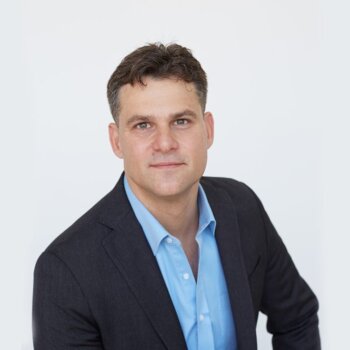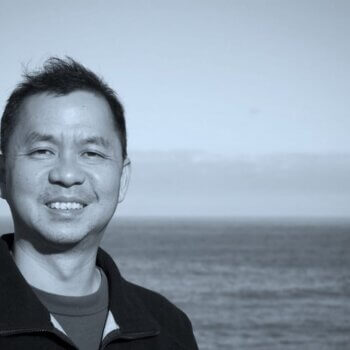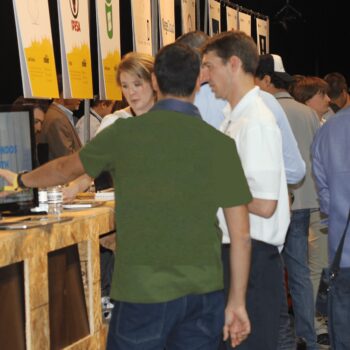In March I spent a week in Alter do Chão and Santarém, cities in the Amazon Forest, in the State of Pará. Alter was incredible: a beautiful place and it gave me a very special energy. It has a mixture of ecological tourism and people willing to live a life more quiet and connected to nature. Santarém is already an average city: more sultry because of the concrete spread in the forest and it has the structure of a city built due to the commercial route between Manaus and Belém, besides the exploitation of minerals and other natural resources of the region. Among several meetings and trips I did there, one talk allowed me a glimpse on the innovation in the north of Brazil.
One of my interests was to visit Projeto Saúde e Alegria (Project Health and Happiness) (PSA). I was not able to go on the field visit, but I could speak with Paulo Lima, one of the project’s coordinators, about the entrepreneurship work they do. It is interesting that, initially, PSA was focused on health care (in TEDxAmazonia one of the founders of the project talks about this story), but later expanded the scope to act with territorial development, thus, bringing more structure and strengthening the communities that live in the forest and fostering entrepreneurship.
Endeavor on the Amazon can be very broad. There is an opportunity for extraction (whether exploring or looking for better ways to do this), tourism (community, sustainable, etc.) or food and other innovative things such as Casa do Saulo restaurant (I told a little bit of his story in here). PSA aims to foster innovation and, at the same time, to show entrepreneurship as an economic alternative, in addition to working with extraction. After all, the mining companies are the biggest employment generators in the region. When finishing the extraction work, what legacy will they leave? That is why PSA has joined with other partners, such as Sebrae and Aliança Empreendedora, to build a development program in the region. It was interesting when Paulo told me a little bit about the program, because over there it needs to be different from what I’ve experienced in the last 4 years working at Endeavor. In the Amazon we can not think about starting a billion dollar company in a community, when there are still several challenges such as access to training / education, the need for infrastructure, the market and access to capital. This does not mean that they can’t innovate or that there are no problems to be solved, however the development process needs to take a step back and start from a more basic level: the creation of entrepreneurs and the development of a workforce.
The program basically has 3 phases. The first one functions as a hackaton: they organize a “Beiradão” of ideas where they bring different challenges so that the participants, young people between 15 and 30 years old, can solve them; they have Arduino programming, skill tests and other activities. The second phase is Educational: they form 2 to 3 classes (total of 70 people) and students go through learning modules. There is a logistic challenge here to take the young people from an isolated community to Santarém. On the other hand, the mix between rural and urban, technical education and university, brings a plurality of ideas that is one of the sweet spots of this initiative. The third phase still happens once in a while and is an acceleration program along with Aliança Empreendedora. Paulo told me a little bit about some of the startups that stood out there.
In general these startups are very incipient. The entrepreneurial ecosystem there also does not contribute for new startups to emerge and for them to grow. If we take as reference the closest cities that were analyzed in the Entrepreneurial Cities Index 2016, we will see that, out of the 32 cities, Belém and Manaus are ranking 26th and 28th respectively. The region still has to run far behind, especially in the development of human capital and innovation, so that new and better companies emerge and, consequently, generate social and economic impact. The Amazon has enormous potential for biotechnology and other natural wealth, but as long as there is a lack of education, infrastructure and access to capital, the challenge will remain big for initiatives like PSA to result in new and better startups. Below, I’ve listed 3 examples of PSA startups that Paulo told me about. They are good ideas with lots of ground to consolidate.
EMBARCAR
http://www.embarcar.net/site/index.php
Embarcar provides information about water transportation from Santarém and region. It would be like the Decolar of the boats. Today the startup consolidates information from the main companies and independent transporters, but the next step is to consolidate itself as a marketplace, also doing the sales of the tickets and helping the shippers with their logistics.
Searching for this type of information is very needed in a region where water transport is widely used, however finding them or making a purchase is difficult. There is nothing available and reliable on the internet and travelers have to jump from boat to boat, along the port to search. Thus, the startup solves a pain that affects both the local resident and the tourist. Their big challenge is to find the product fit. Make the shippers show the information and carry out the sales, charging a service fee (for the shipper or the traveler).
TIPITI
http://www.clubetipiti.com.br/
Tipiti is a shopping club of products originally from Pará. It is the Glambox from the Amazon. With deliveries throughout Brazil, you can signup and receive a monthly box with sustainable products from the Amazon. At the moment they have an initial box that includes cachaça of Jambú (delicious!), handicrafts, tapioca flour and other local varieties.
The shopping club model is already used by several startups. Some went very well, such as Wine, and others had their failures, such as Shoes4You. In any case, the initiative commercially exploits regional products that can be directed both to the local market and to other Brazilians interested in the culture and in the delights of Pará.
COCORICO
https://www.facebook.com/cocoricocaipiraoficial/
Delivery of free-range eggs and chicken. These foods are very consumed by the people from Pará. According to Paulo, the preference for them is even higher than fish. The initiative produces the chickens and sells through the channels of Facebook and Whatsapp. But it seemed to me it is still very incipient, with a long way to consolidating.
__________________________________________________
About the Author
This article was written by Pablo Ribeiro, see more.





























